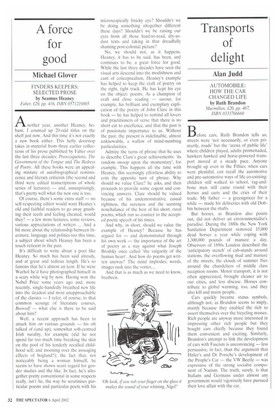A force for good
Michael Glover
FINDERS KEEPERS: SELECTED PROSE by Seamus Heaney Faber, £20, pp. 416, ISBN 0571210805 Another year, another Heaney, hohum. I counted up 20-odd titles on the shelf just now. And this time it's not exactly a new book either. This hefty doorstop takes in material from three earlier collections of his prose published by Faber over the last three decades: Preoccupations, The Government of the Tongue and The Redress of Poetry. All these books were an appealing mixture of autobiographical reminiscence and literary criticism (the second and third were edited transcriptions of whole series of lectures) — and, unsurprisingly, that's pretty well what the new one is too.
Of course, there's some extra stuff — no self-respecting editor would want Heaney's old and faithful readers to go away gnashing their teeth and feeling cheated, would they? — a few more lectures, some reviews. various appreciations of writers ... And a bit more about the relationship between literature, language and politics too this time, a subject about which Heaney has been a touch reticent in the past.
It's difficult to write about a poet like Heaney. So much has been said already, and at great and tedious length. He's so famous that he's almost an icon. If he were Warhol he'd have photographed himself in a scary white wig by now. Having won the Nobel Prize some years ago and, more recently, single-handedly breathed new life into the deadest and most unapproachable of the classics — I refer, of course, to that common scourge of literature courses, Beowulf — what else is there to be said about him?
Well, a recent approach has been to attack him on various grounds — his oft talked of (and up), somewhat soft-centred Irish rurality, for example (did he not spend far too much time breaking the skin on the pool of his tenderly recalled childhood self, and mooning over the assuaging effects of bogland?); the fact that, not noticeably being a woman himself, he seems to have shown scant regard for gender studies and the like. In fact, he's altogether pretty conventional in some respects really, isn't he, the way he scrutinises particular poems and particular poets with his microscopically finicky eye? Shouldn't we be doing something altogether different these days? Shouldn't we be raising our eyes from all those hard-to-read, dry-asdust texts and taking in that dreadfully shaming post-colonial picture?
No, we should not, as it happens. Heaney, it has to be said, has been, and continues to be, a great force for good. While the last three decades have seen the visual arts descend into the modishness and cant of conceptualism, Heaney's example has helped to keep the craft of poetry on the right, tight track. He has kept his eye on the object: poems. As a champion of craft and close reading — savour, for example, his brilliant and exemplary explication of the poetry of John Clare in this book — he has helped to remind all lovers and practitioners of verse that there is no short cut to excellence, and that the past is of passionate importance to us. Without the past, the present is indefinable, almost unknowable, a wallow of mind-numbing particularities.
Admire the turns of phrase that he uses to describe Clare's great achievements: its random swoop upon the momentary', for example. This happens all the time with Heaney, this seemingly effortless ability to coin the apposite turn of phrase. Why should we value Clare? he asks, and then proceeds to provide some cogent and convincing answers. Clare should be valued because of his undemonstrative, casual rightness, the sureness and the seeming nonchalance of the best of his short, rural poems, which run so counter to the accepted poetic speech of his times.
And why, in short, should we value the example of Heaney? Because he has argued for — and demonstrated through his own work — the importance of the art of poetry as a stay against what Joseph Brodsky once called 'the vulgarity of the human heart'. And how do poems get written anyway? The mind implodes; words, images rush into the vortex...
And that is as much as we need to know, brethren.






























































 Previous page
Previous page